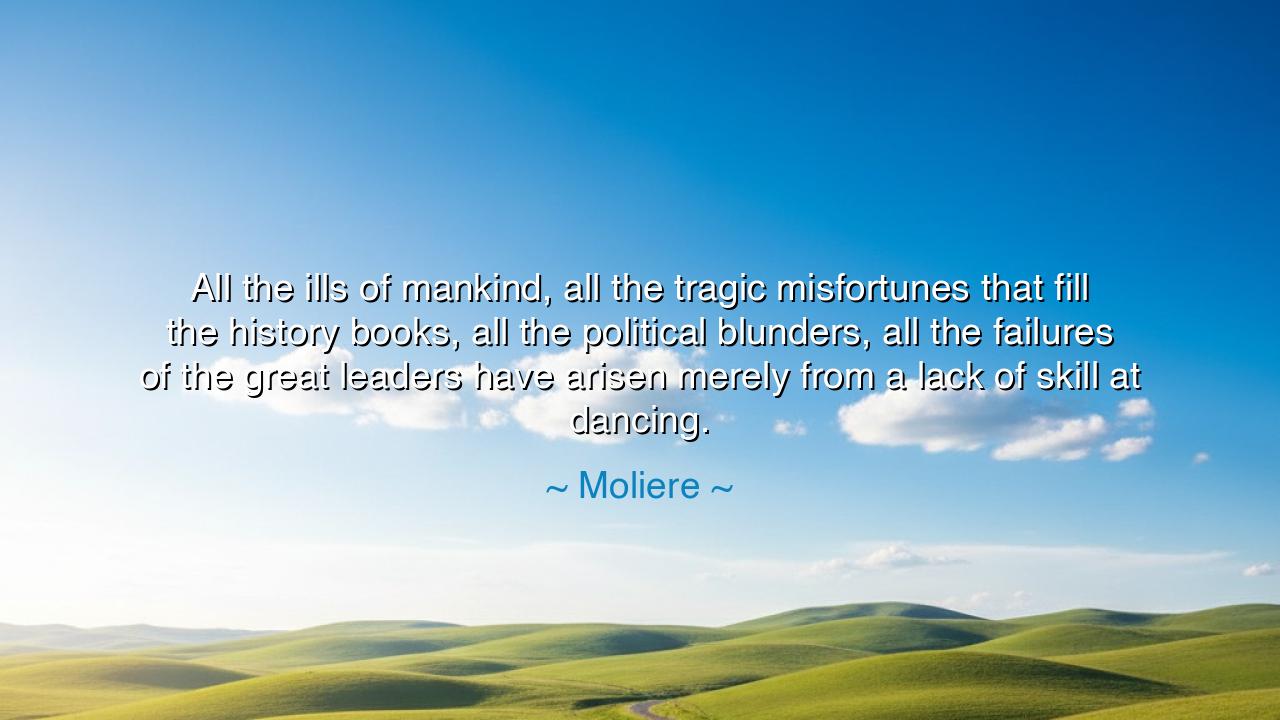
All the ills of mankind, all the tragic misfortunes that fill the
All the ills of mankind, all the tragic misfortunes that fill the history books, all the political blunders, all the failures of the great leaders have arisen merely from a lack of skill at dancing.






“All the ills of mankind, all the tragic misfortunes that fill the history books, all the political blunders, all the failures of the great leaders have arisen merely from a lack of skill at dancing.” – Molière
In this whimsical yet profound statement, Molière, the great playwright of France, reveals one of the deepest truths about human nature — that grace, harmony, and understanding are the true foundations of civilization, and that their absence leads to chaos. When he says that all the ills of mankind arise from a “lack of skill at dancing,” he does not speak of dancing merely as the art of moving to music. He speaks of the dance of life itself — the rhythm between people, the balance of thought and feeling, the harmony between nations, and the delicate choreography of human relations. The dance, in Molière’s metaphor, is not frivolity, but the symbol of order, connection, and grace — the very virtues that, when forgotten, turn mankind’s steps into stumbling.
The origin of this quote lies in Molière’s lifelong observation of human folly. As a dramatist in the glittering yet corrupt court of Louis XIV, he used laughter to reveal the vanities, hypocrisies, and absurdities of his age. The France of his time was a world obsessed with appearances — where etiquette was worshiped but sincerity neglected, where noblemen danced at court but failed to move with wisdom in politics or heart. With irony sharpened by wit, Molière saw that men could master the steps of courtly dance but not the rhythm of life. Thus, he turned this truth upon its head: if they had truly learned to dance — to move with awareness, poise, and respect for others — perhaps the world would have known less suffering. For him, dancing was the symbol of civilization rightly lived.
To dance, in the spirit of Molière, is to understand the principle of harmony. In a dance, one must be both self-aware and other-aware, leading and yielding, finding rhythm with one’s partner and with the music. The dancer listens not only to sound, but to silence — to the pauses, the subtleties, the unseen cues that sustain motion. And so it is with the dance of human affairs. The leader who does not listen, the people who do not move in unity, the nation that refuses to adjust its steps — these all stumble into ruin. Molière, through jest, teaches that political blunders and human conflicts arise from an absence of grace, from men who force when they should yield, who speak when they should listen, who march when they should flow.
History bears countless witnesses to his wisdom. Consider the tale of Marie Antoinette, the queen whose reign danced toward disaster. Surrounded by splendor, she lived amid the most refined culture of her time — yet her rhythm was out of tune with her people. While famine spread through France, she moved to the music of privilege, deaf to the hunger below the palace gates. When the rhythm of her nation shifted toward revolution, she could not adjust her step. The result was not merely her fall, but the collapse of an era. Had she, and the nobles who surrounded her, understood the dance between ruler and ruled, the balance of empathy and power, perhaps the guillotine would never have risen over France.
And yet, there are examples of leaders who knew how to dance with destiny. Think of Abraham Lincoln, who led his nation through civil war not with rigidity, but with rhythm — the rhythm of patience, of compassion, of humor amid hardship. He knew when to press forward and when to pause, when to speak and when to remain silent. He understood that leading a divided people was not a march of force, but a dance of understanding. This ability to move with grace amid chaos, to find harmony amid discord, is the skill Molière exalts — the true art of dancing through life’s storms.
Thus, Molière’s words are more than jest — they are a philosophy of living. To lack skill at dancing is to lack the ability to move with others, to read the rhythms of time, to adjust without losing oneself. The clumsy, the proud, the inflexible — these are the ones who stumble through history, leaving behind trails of ruin. But those who dance with awareness, who balance firmness with gentleness, who seek rhythm in chaos — they create beauty where others sow destruction. For the dance is not only movement; it is wisdom made visible.
So, my child of reflection, take this lesson into your days: learn to dance — not merely with your feet, but with your heart and mind. Dance in your speech, with words that flow rather than strike. Dance in your thoughts, balancing reason with feeling. Dance in your dealings with others, meeting them with both strength and grace. The world, Molière reminds us, falters when men forget how to move with harmony — when they force instead of flow, when they command instead of listen. But when we rediscover the art of dancing, we rediscover the art of being human.
For in the end, the world itself is a grand dance — the stars circling the heavens, the tides rising and falling, the seasons turning in endless rhythm. To live wisely is to move in time with this cosmic music. And so, as Molière whispers across the ages: learn to dance well, and you shall heal many ills — for grace, balance, and harmony are the antidotes to all the tragedies of mankind.






AAdministratorAdministrator
Welcome, honored guests. Please leave a comment, we will respond soon